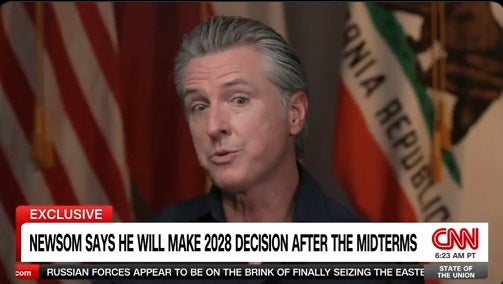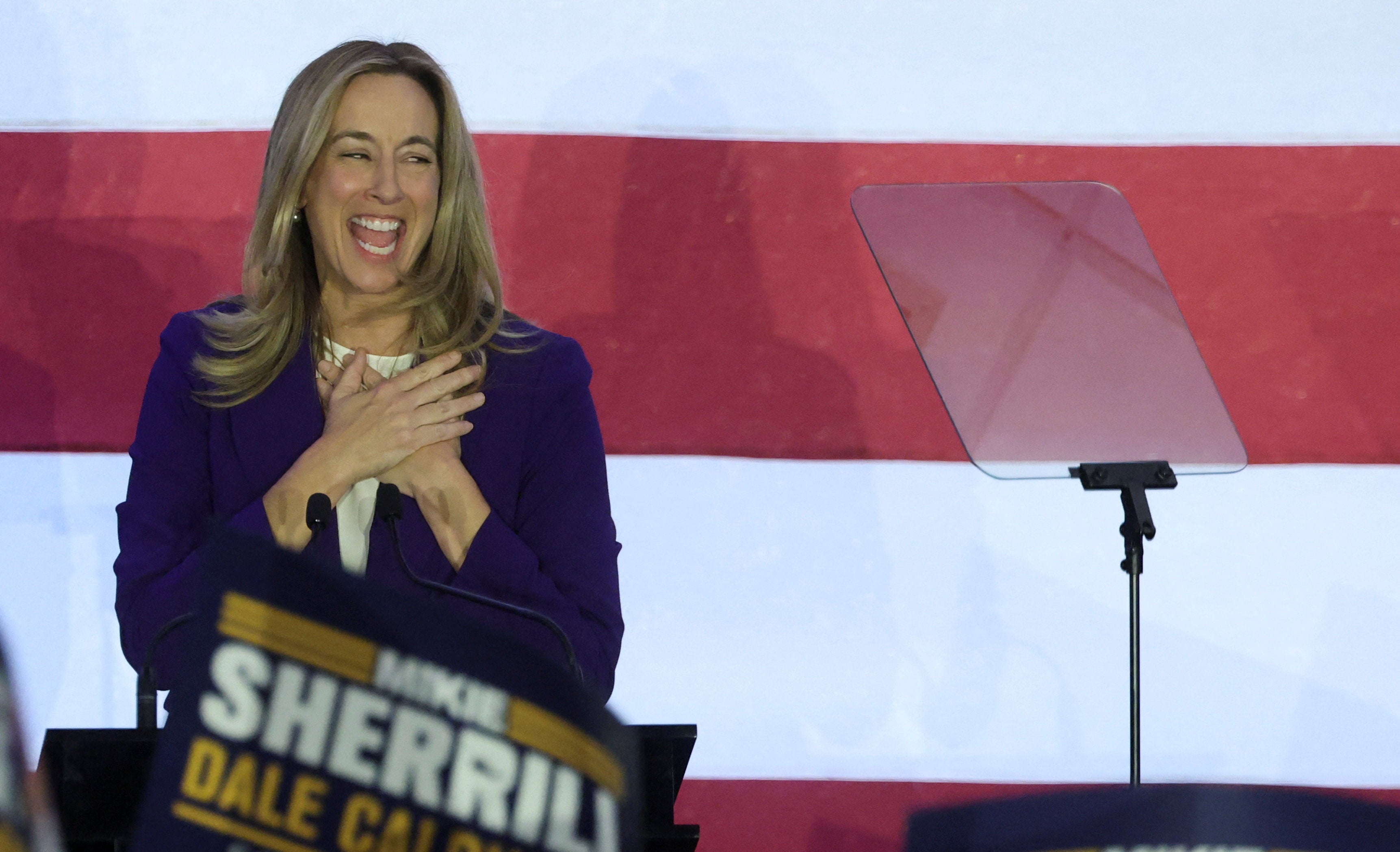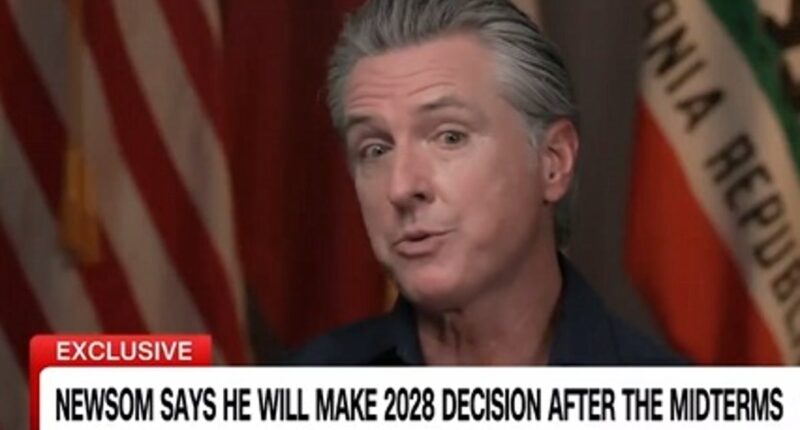Gov. Gavin Newsom portrayed himself and members of his party’s leadership in Congress as heralding a new era for Democrats on Sunday, while declaring that the past was behind them.
In doing so, he took a clear shot at the buttoned-up “concern” and failure to meet the urgency of the moment that seemed to define his party’s leaders through the Biden era, which much of the American left now looks upon with frustration as it plans for 2026 and 2028.
Newsom gave an extended interview to CNN’s Jake Tapper, which aired Sunday on State of the Union. It’s the governor’s third domination of Washington’s Sunday news cycle in a row, as clear a sign as any that the two-term Californian plans to pursue national ambitions after his term ends in 2026. During it, he once again stated that he’d make considerations about running for president in 2027, once the midterm election cycle was over.
But he was clear on one point regarding his party’s future: The California redistricting push, he said, exemplified the new “fight fire with fire” attitude that Democrats would carry into the next elections.
“I think Donald Trump did not expect what Californians did. He thought we would just try to win an argument by writing an op-ed. Maybe express disdain and concern,” Newsom said, calling those a representation of “the Democratic Party of old”.

He added that Tuesday’s election victories, including in California where a ballot measure to grant state officials the authority to redraw congressional maps ahead of the midterms, were signs that voters were clearly on their side.
“What happened on Tuesday represents a new moment of clarity, conviction, purpose, energy on our toes, not on our heels, a resurgent Democratic Party,” he said. “That kind of momentum and direction is, I think, really going to enliven people in the next year.”
The governor’s jab at the former president was indirect, but not subtle. The former members of the Biden White House and their associated allies throughout the Democratic Party continue to face questions not about the party’s future, but its past: Namely, regarding why they didn’t raise concerns about the toll the president’s age and diminished capacities were taking not just on Biden himself, as he ran for re-election, but the party as a whole. Before the president dropped out of the race in the summer of 2024, Democrats like Tommy Vietor (formerly of the Obama White House, now a Pod Save America host) were reporting internal polling that indicated their party was on track for a nationwide bloodbath that would purge Democrats from government up and down the ballot.
But they also face questions about Biden’s actual time in the White House off the campaign trail, too; many remain furious that the Department of Justice, under Biden, waited until 2022 to take any serious action aimed at holding Donald Trump and his cronies accountable for the January 6 attack and the efforts to overturn the 2024 election. That lack of urgency, many Democrats argue, persists today as congressional leaders like House Minority Leader Hakeem Jeffries and Senate Minority Leader Chuck Schumer have faced criticisms from their base over whether they are presenting an adequate opposition front against the president’s right-wing agenda.
On Tuesday, when Democrats swept the GOP in a number of highly-watched statewide elections, a feeling of anger on the left was palpable. Gov.-elect Mikie Sherrill, in New Jersey, used language very similar to Newsom’s in interviews after her victory, telling CBS’s Margaret Brennan about her plan to address cost of living issues: “I’m not writing a strongly worded letter. I’m not doing a 10-year plan. I’m on Day 1 declaring a state of emergency.”

Newsom, however, credited the two Democratic leaders in his interview with Tapper for capitalizing on the anger felt by Democrats and independents alike, many of the latter of which broke for Trump over Kamala Harris in 2024 amid the Democratic collapse. He pointed to their strategy in dealing with Republicans under the ongoing federal government shutdown as reason why.
“I give Jeffries and Schumer tremendous credit,” said Newsom. “They’ve galvanized people of all political stripes — rural, urban, suburban — on the issue that defines so many problems in so many ways, and that’s healthcare, and the anxiety people are about to feel with 100% to 388% increase in premiums.”
Unmentioned by the governor was Schumer’s public opposition to refusing Democratic votes for legislation to prevent a shutdown in March, when Democrats pressed him to use leverage against the White House to halt the DOGE-led slashing and burning of federal agencies including USAID.
The governor went on to identify Trump as the main obstacle preventing the re-opening of the government, arguing that the president going back on his position that the White House should lead negotiations with Congress (which Trump expressed publicly in a 2011 tweet) to avert or end a shutdown was evidence that Trump simply didn’t care enough to work to end this one.
.jpeg)
“He went golfing that weekend before the shutdown…He had no interest or energy into avoiding this government shutdown. He has no interest or energy to end it today; he’s the president of the United States!” exclaimed the governor. “You have a responsibility to convene, to bring people together…full stop.”
Trump has spent this latest weekend on Truth Social complaining about the Democrats’ demands for their votes. Schumer, alongside some Senate Democrats, is floating a one-year extension of Affordable Care Act subsidies (which are necessary to prevent huge premium spikes for millions of Americans) as his party’s demand for enough votes to end a shutdown; Republicans continue to refuse, publicly, to negotiate and the various involved lawmakers haven’t been to the White House a single time to discuss the matter with the president or his team.

As the shutdown approaches the end of its 40th day, the president is now raising the issue, once again, of scrapping the Affordable Care Act altogether — this time with the added enticement of suggesting that the money the federal government supposedly saved would go right back into Americans’ pockets. This almost certainly won’t happen; during Trump’s first term Republicans tried and failed to repeal the Affordable Care Act and replace it, only to discover that the party had no unified vision of what that replacement should be. The vote failed in a major defeat that defined Trump’s first year as president in 2017.
With the president now openly spitballing on social media on the topic once again, Republicans are being forced to confront a reality that some in their own party, like the rebel GOP congresswoman of Georgia, Marjorie Taylor Greene, have pointed out: that there still is no health care plan or Obamacare alternative with the endorsement of Republican leadership or a majority of their caucuses in Washington.
“We don’t have a formal [health care] proposal,” Treasury Secretary Scott Bessent admitted Sunday on ABC’s This Week.
He added: “The president’s posting about it, but we have got to get the government reopened before we do this.”









